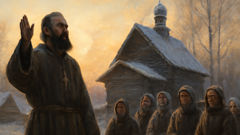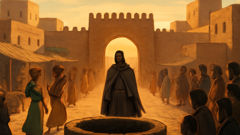Introduction
Russia in the 17th century was a land torn between tradition and transformation. The long shadow of the Kremlin crept over villages dusted with snow, and the ringing of church bells echoed across frozen rivers. Within this vast, unforgiving landscape, faith was more than custom—it was survival, a thread binding the peasant to the tsar, the family to the land, and the soul to eternity. Yet this thread was fraying. In Moscow, Patriarch Nikon, with the tsar’s backing, sought to reform the rituals of the Orthodox Church, aligning them more closely with Greek practices. For some, these changes were mere corrections. For others, they were sacrilege, a threat to the very core of Russian identity.
Into this conflict strode Archpriest Avvakum Petrov. Born to a humble family near Nizhny Novgorod, Avvakum’s early life was steeped in hardship and devotion. The son of a village priest, he was trained in scripture and schooled in the rhythms of rural piety. He watched his mother pray with tears, saw his father tend to his flock with calloused hands, and learned to revere the old ways—the sign of the cross with two fingers, the sacred words chanted in Slavonic, the incense curling in wooden chapels.
As Avvakum rose through the ranks of the clergy, his voice grew bold and unwavering. He denounced the reforms, convinced they would sever Russia from its holy roots. This resistance was not mere stubbornness; it was agony and love bound together. He preached with fervor, thundered against the corrupt and the indifferent, and inspired a movement now known as the Old Believers. But such defiance came at a cost. Avvakum faced arrest, torture, and the bitter cold of Siberian exile. Yet, instead of breaking, he wrote—his autobiography, scrawled in cramped script on scraps of birch bark and faded paper, would become a landmark of Russian literature.
This is the story of Archpriest Avvakum: a tale of spiritual struggle and steadfastness, of banishment and brotherhood, of the indomitable will to preserve faith against the tides of change. His life, illuminated by his own vivid words, stands as a testament to the enduring power of conviction.
Early Years: In the Shadow of Tradition
The village of Grigorovo, where Avvakum was born, seemed a world apart from the tumult of Moscow. Life here moved with the seasons, punctuated by feast days and funerals, harvests and hunger. Even as a child, Avvakum felt the weight of tradition pressing on his shoulders. The Orthodox faith saturated every moment—icons glimmered in cottage corners, prayers were whispered over the cradle and the grave, and ancient chants drifted from candlelit chapels.
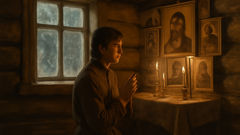
His father, Petr, was a parish priest whose gentle hands could coax a smile from the weariest widow. Yet it was Avvakum’s mother who carved his spiritual backbone. She was a woman of fierce devotion, her voice trembling as she prayed for the souls of her children. Each morning, she would lead Avvakum by the hand to the family’s icon corner, pressing his fingers together in the sign of the cross—two fingers, as their ancestors had done for centuries. This act was no mere ritual; it was a declaration of belonging to a sacred lineage.
From his earliest days, Avvakum learned that faith was woven into hardship. The family scraped by on meager harvests and gifts from the flock. There were winters when the bread ran out and only prayer warmed their bellies. Yet these privations shaped Avvakum’s character. When the river froze and wolves howled at night, he would huddle by the stove, listening to his father read from the lives of saints—their trials, their visions, their unwavering faith. These tales planted seeds in the young boy: that suffering could be holy, that truth demanded sacrifice.
As Avvakum entered adolescence, his intellect blossomed. He devoured scripture and hagiographies, learning to parse the mysteries of God and man. His mother’s death when he was still young marked him indelibly; grief became his companion, and his prayers grew sharper, edged by longing.
By the age of sixteen, Avvakum was serving alongside his father at the altar. He donned the priestly vestments with trembling awe, feeling the centuries behind each embroidered thread. Yet even then, rumors from Moscow seeped into their village: whispers of change, of new practices creeping into the holy liturgy. Avvakum’s soul bristled at the thought. For him, these old rituals were more than habit—they were truth itself, tested by martyrdom and miracle.
Rising Dissent: The Fire of Faith
Avvakum’s ordination brought new responsibilities, and soon he found himself serving in Nizhny Novgorod—a bustling crossroads of faith and commerce. Here, he confronted not only the poverty of the body but also what he saw as the poverty of the spirit. Corruption nestled among the clergy, and indifference dulled the hearts of many. Avvakum thundered from the pulpit, his sermons ablaze with warnings and hope. He spoke of purity, of humility, of clinging to the faith of their forefathers. Some loved him for his zeal; others found him insufferable, a troublemaker whose sharp tongue cut too close.
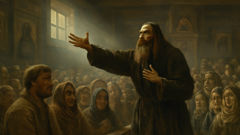
It was during these years that the first tremors of the church reforms began to shake Russia. Patriarch Nikon, recently installed in Moscow, was determined to purify Russian Orthodoxy, ridding it of what he called errors that had crept in over centuries. The changes seemed technical to outsiders: three-fingered signs of the cross instead of two, altered spellings in prayers, shifts in the direction of processions. But to Avvakum and others like him, these adjustments were an existential threat—a rupture with Holy Tradition, a betrayal of Russia’s sacred inheritance.
Avvakum rallied fellow priests and villagers to resist. He debated with bishops, wrote impassioned letters to the tsar, and refused to adjust his liturgy. His defiance made him a marked man. Soon he was summoned to Moscow to answer for his stubbornness.
The city dazzled and appalled him. Its gold-domed cathedrals glittered above muddy streets, and the corridors of power hummed with intrigue. In the council chambers, Avvakum stood alone against a tide of learned men who mocked his backwardness. Yet he refused to yield. Even when threatened with imprisonment, he would not bend his neck.
His obstinacy enraged Patriarch Nikon and the tsar’s advisors. They branded him a heretic, an agitator intent on poisoning the faithful. Yet among ordinary people, word of Avvakum’s courage spread like wildfire. In taverns and fields, his name was whispered with awe—some cursed him, some blessed him, but all remembered him.
Exile and Torment: The Cold Embrace of Siberia
The first taste of exile came swiftly. Avvakum was arrested, shackled, and marched across hundreds of versts to Siberia—a sentence meant to break his body and spirit. The journey was brutal. His feet bled through torn boots, frost bit at his cheeks, and hunger gnawed his insides. Guards jeered at him; fellow prisoners died by the roadside. Yet Avvakum did not falter. In the wilderness, he found a strange solace—a silence in which he could pray without interruption, an expanse where only God could judge him.
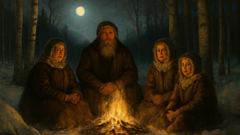
His wife, Anastasia, and children were permitted to follow, enduring hardships almost unimaginable. Anastasia proved herself as steadfast as her husband, sharing in his suffering and bolstering his faith during moments of despair. Together, they built a makeshift chapel from birch logs, gathering exiled believers for secret services. Avvakum’s voice—hoarse from cold but undiminished in conviction—rose above the howling winds.
Siberia was a crucible. Avvakum endured beatings, starvation, and mockery. Once, guards tried to drown him in the icy Lena River; he survived, clinging to a vision of martyrdom. On bitter nights, he wrote letters—fiery missives to the tsar, pleas for mercy from distant bishops, and messages of encouragement to scattered Old Believers. These writings bristled with rage and hope, painting Siberia not just as a place of punishment but as a battleground for Russia’s soul.
Through all this, Avvakum remained defiant. He refused to renounce the old faith or accept the new rituals. His refusal inspired others in exile: peasants, monks, even noblewomen exiled for their beliefs. They gathered around Avvakum’s fire, sharing crusts of bread and stories of loss. In his suffering, Avvakum became a symbol—not just of resistance, but of endurance.
Yet exile also brought introspection. Amid the snowdrifts and endless taiga, Avvakum wrestled with doubt and fear. He questioned his motives: Was he truly serving God or merely indulging in pride? He recalled his mother’s tears, his father’s humility, the faces of villagers left behind. These moments of vulnerability only deepened his faith. For Avvakum, pain was not proof of abandonment—it was a gift, sharpening his longing for heaven.
Conclusion
Avvakum’s ordeal stretched over decades—a saga of faith battered by wave after wave of persecution. Yet his greatest legacy was not merely his survival, but the written testament he left behind. In exile, Avvakum turned his sufferings into words: his autobiography became a searing account of injustice, endurance, and the peculiar beauty found in suffering for a righteous cause. He wrote with the rawness of lived pain, blending humility and indignation, sorrow and hope. His sentences pulsed with the rhythms of peasant speech and the grandeur of scripture, giving voice to those who had none.
As the years passed, Avvakum’s influence spread far beyond Siberia. Secret communities of Old Believers treasured his letters, copying them by hand and reading them by candlelight. His story became a rallying cry—a reminder that faith could survive in the harshest exile, that conscience could outlast oppression. Though Avvakum would ultimately perish by fire, burned at the stake for refusing to compromise, his words endured. They shaped the future of Russian literature, giving birth to a tradition of introspective, confessional prose.
Today, Avvakum is remembered not only as a martyr and leader of the Old Believers, but as the father of Russian autobiography—a voice from the wilderness who turned personal suffering into cultural memory. His life reminds us that conviction can illuminate even the darkest corners of history, leaving a trail of hope for generations to come.

